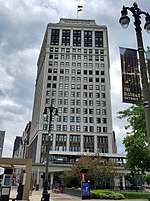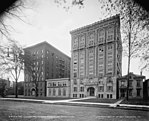Wright–Kay Building
1891 establishments in MichiganCommercial buildings on the National Register of Historic Places in MichiganNational Register of Historic Places in DetroitOffice buildings completed in 1891Rock Ventures ... and 3 more
Skyscraper office buildings in DetroitUse American English from June 2022Use mdy dates from June 2022

The Wright–Kay Building, originally known as the Schwankovsky Temple of Music, is one of the oldest buildings in downtown Detroit, Michigan. It is located at 1500 Woodward Avenue, at the corner of Woodward and John R. Street, in proximity to the Lower Woodward Avenue Historic District. The building was listed on the State of Michigan's Historical Register in 1980 as #P25241.
Excerpt from the Wikipedia article Wright–Kay Building (License: CC BY-SA 3.0, Authors, Images).Wright–Kay Building
Woodward Avenue, Detroit
Geographical coordinates (GPS) Address Nearby Places Show on map
Geographical coordinates (GPS)
| Latitude | Longitude |
|---|---|
| N 42.335138888889 ° | E -83.049166666667 ° |
Address
Wright Kay Bldg (Schwankovsky's Temple of Music)
Woodward Avenue 1500
48226 Detroit
Michigan, United States
Open on Google Maps











